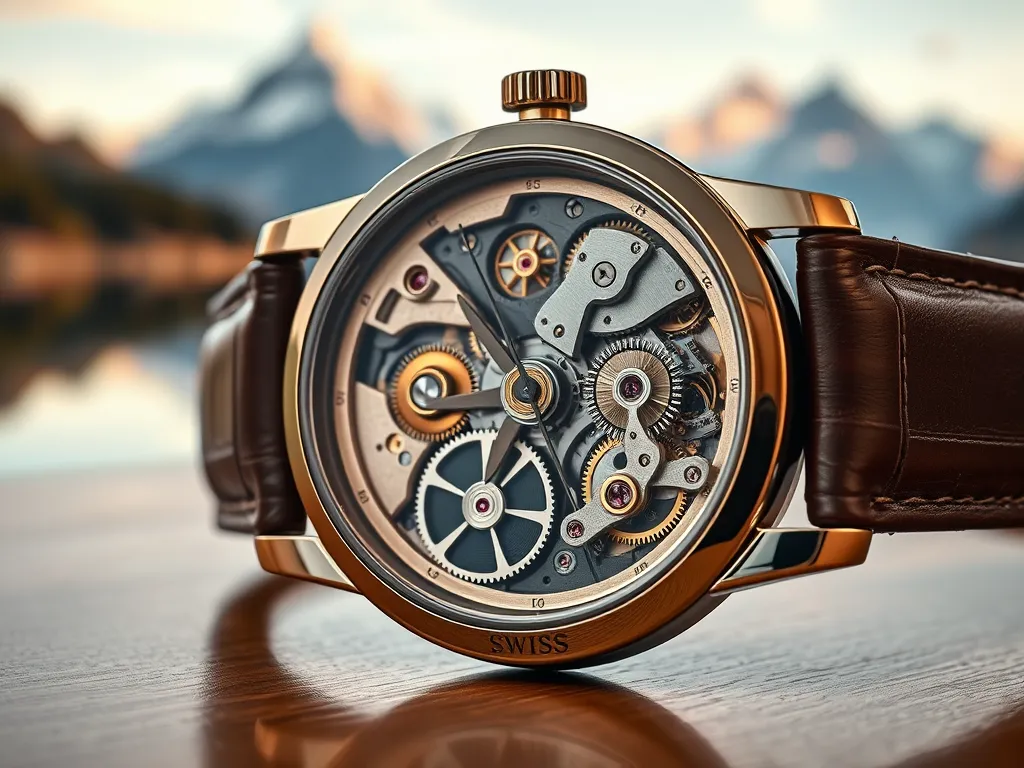Discover the Art and Precision of Swiss Watchmaking

The Art and Legacy of Swiss Watchmaking
Swiss Watchmaking is synonymous with precision, craftsmanship, and timeless elegance. For centuries, Swiss watchmakers have set the standard for high-quality timepieces that exemplify the meticulous artistry and innovative techniques that go into their design and manufacture. Known worldwide, Swiss watches not only serve a functional purpose but also represent a blend of tradition and modernity, making them highly coveted by collectors and enthusiasts alike.
At the heart of Swiss Watchmaking is a commitment to quality and detail. The luxury of a Swiss watch lies in the hours of painstaking work dedicated to its creation, often involving over 300 handcrafted parts. This intricate processus enchanteurs not only ensures that each timepiece operates flawlessly but also contributes to its status as a work of art. From the small villages of the Jura Mountains where iconic watchmakers originated, to the bustling watch fairs in Geneva, the influence of Swiss watchmaking is profound and globally recognized.
Swiss Watchmaking is also noted for its rich heritage, with a history that dates back to the 16th century when Huguenot craftsmen brought their skills to Switzerland. Over the centuries, these craftsmen innovated and established techniques that would revolutionize the industry. The combination of their artisanal practices and the serene environment of the Swiss landscape has resulted in the luxurious and enduring legacy that defines Swiss watches today.
As we delve into the world of Swiss Watchmaking, we must highlight its inherent craftsmanship. Each piece is a testament to the dedication of the artisans, and the blend of tradition with modern technology continues to produce some of the finest timepieces in the world. Whether it's the classic mechanical movements or the emerging trend of smartwatches, Swiss watchmakers continue to lead the industry by marrying heritage with innovation.
the precision and craftsmanship of Swiss Watchmaking have set a global standard for excellence in horology.
Finally, the cultural significance of Swiss Watches cannot be overlooked. They are not just instruments of timekeeping but symbols of status and sophistication. Renowned for their unmatched quality, Swiss watches have significantly influenced the global watch industry, shaping trends and setting new standards. The passion for watchmaking and the appreciation of these intricate timepieces also extend to cultural events and exhibitions, reinforcing the love for horology around the world.
History of Swiss Watchmaking
Swiss Watchmaking began to flourish in the 16th century, attributed mainly to the influx of Huguenot craftsmen fleeing religious persecution in France. They brought their watchmaking expertise to Switzerland, particularly in regions such as Geneva and Neuchâtel. This period marked the transition from rudimentary timekeeping devices to more sophisticated mechanical watches. The invention of the balance spring in the 17th century further revolutionized the accuracy of timepieces, establishing Switzerland as a leader in the watchmaking industry.
Significant figures in Swiss Watchmaking include names such as Abraham-Louis Breguet, who is known for his innovations in watch design and development of timekeeping mechanisms. His contributions, including the tourbillon and the Breguet hands, greatly influenced not only Swiss watchmaking but the entire horological field. Other notable figures include John Arnold, who introduced the first keyless winding system, and Georges Daniels, who revived traditional watchmaking techniques in the 20th century.
Over the years, Swiss Watchmaking has evolved, embracing various styles and techniques. From the ornate pocket watches of the 18th century to the minimalist designs of the contemporary era, each style showcases the creativity and technical skills of the craftsman. The introduction of quartz movements in the 1970s presented a challenge to traditional mechanical watches, leading to innovation and adaptation within the industry, ensuring that the Swiss watchmakers remained at the forefront of horological excellence.
Craftsmanship in Swiss Watches
The craftsmanship involved in Swiss watches is unparalleled, characterized by the use of high-quality materials. Swiss watchmakers typically use precious metals such as gold, platinum, and stainless steel, along with luxurious finishes like enamel and guilloché. Additionally, the watch dials are often adorned with gems, providing not only aesthetic beauty but also enhancing the durability and value of the timepieces. This attention to detail in material selection contributes to the overall prestige associated with Swiss watches.
Techniques of hand assembly are a hallmark of Swiss craftsmanship. Each watch is completed by skilled artisans who meticulously assemble the movements by hand, ensuring precision and care at every stage. This includes tasks such as adjusting the escapement, placing the gears, and testing the temperature stability, which require years of training and experience. The process can take several months, and the dedication to perfection is evident in the final product, leading to extraordinary reliability and longevity.
The role of master watchmakers is crucial in maintaining the high standards of Swiss Watchmaking. These artisans not only design and fabricate watch components but also pass on their knowledge through apprenticeships, ensuring the preservation of traditional techniques. Master watchmakers are often celebrated for their unique contributions to the craft, and many have created iconic timepieces that define their brands. The elite status of master watchmakers further emphasizes the prestige associated with Swiss horology.
Famous Swiss Watch Brands
No discussion of Swiss Watchmaking is complete without mentioning Rolex, perhaps the most recognizable watch brand globally. Established in 1905, Rolex has set a benchmark in luxury watchmaking by introducing innovations such as waterproof cases and automatic movements. Their timepieces, characterized by precision and elegance, have become synonymous with wealth and success, transcending generations and cultural boundaries through their association with high-profile figures and events.
Patek Philippe, founded in 1839, is another beacon of Swiss Watchmaking excellence. Known for its complicated watches and exceptional craftsmanship, Patek Philippe has a strong heritage of innovation, including the first wristwatch with a perpetual calendar. The brand’s commitment to traditional techniques combined with modern advancements ensures its reputation among connoisseurs, as Patek Philippe timepieces often appreciate significantly in value over time, marking them as prized possessions.
Swatch stands as a testament to the diversity within Swiss Watchmaking. Established in the 1980s, Swatch revolutionized the market by providing affordable yet stylish watches, making Swiss quality accessible to a broader audience. The brand not only plays a vital role in the contemporary watch industry but also actively engages in collaborations with artists, designers, and cultural movements, demonstrating that Swiss watchmaking can be both luxurious and inclusive.
Technology in Swiss Watchmaking
Advancements in watch movements are continuously redefining Swiss Watchmaking. With the introduction of automatic and quartz movements, Swiss manufacturers have maintained their position as leaders in innovation. The integration of advanced materials like silicon in movements has led to lower friction and increased precision, paving the way for the development of watches with exceptional mechanical longevity, durability, and resistance to magnetic fields.
The rise of smartwatches has prompted traditional Swiss watchmakers to innovate, leading to the creation of hybrid models that blend classic design with modern technology. This symbiosis allows brands to reach new audiences while still capturing the essence of Swiss workmanship. Companies like TAG Heuer and Montblanc have taken the challenge to find a balance between digital functionality and horological tradition, showcasing that Swiss Watchmaking can adapt while preserving its core values.
Chronometry and precision standards remain a point of pride for Swiss Watchmaking. Certification from the Swiss Official Chronometer Testing Institute (COSC) guarantees the accuracy of mechanical Swiss watches, ensuring the compliance of brands with established standards. These rigorous testing processes not only highlight the technical prowess of the manufacturers but also reinforce the integrity and reliability that Swiss watches are known for.
The Cultural Significance of Swiss Watches
Swiss Watches have become status symbols worldwide, often associated with luxury and sophistication. Owning a Swiss watch is not only a matter of practicality but also a demonstration of personal taste and social prestige. The craftsmanship, heritage, and brand reputation surrounding Swiss watches create a powerful allure that attracts individuals from all walks of life, from common enthusiasts to global elites.
The impact of Swiss Watchmaking on the global watch industry is profound. As the benchmark for quality, many brands from other countries strive to emulate the standards set by Swiss manufacturers. The prevalence of Swiss watches in markets around the world promotes a culture of excellence, compelling other manufacturers to raise their production quality. Furthermore, the Swiss watch industry represents a significant economic entity, contributing to the country’s economy while influencing fashion and lifestyle trends globally.
Cultural events and watch exhibitions, such as Baselworld and SIHH (Salon International de la Haute Horlogerie), serve as showcases for the latest innovations in Swiss Watchmaking. These gatherings attract industry professionals and enthusiasts alike, uniting the watch community to celebrate horology. Such events foster collaboration, spark creativity, and highlight the cultural significance of Swiss watches, ensuring their prominent place in contemporary society.
